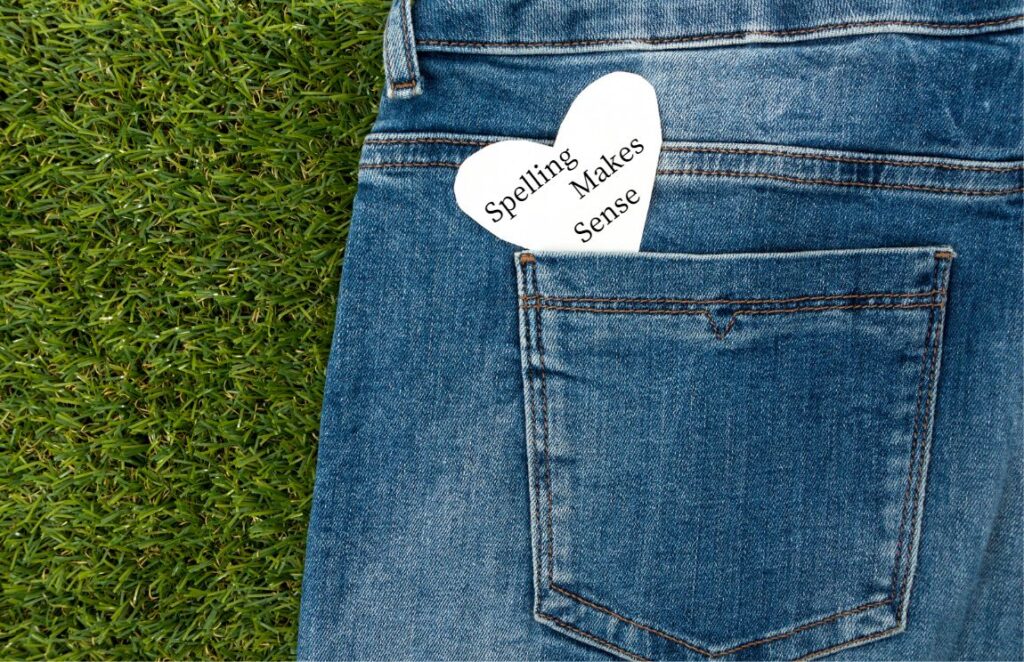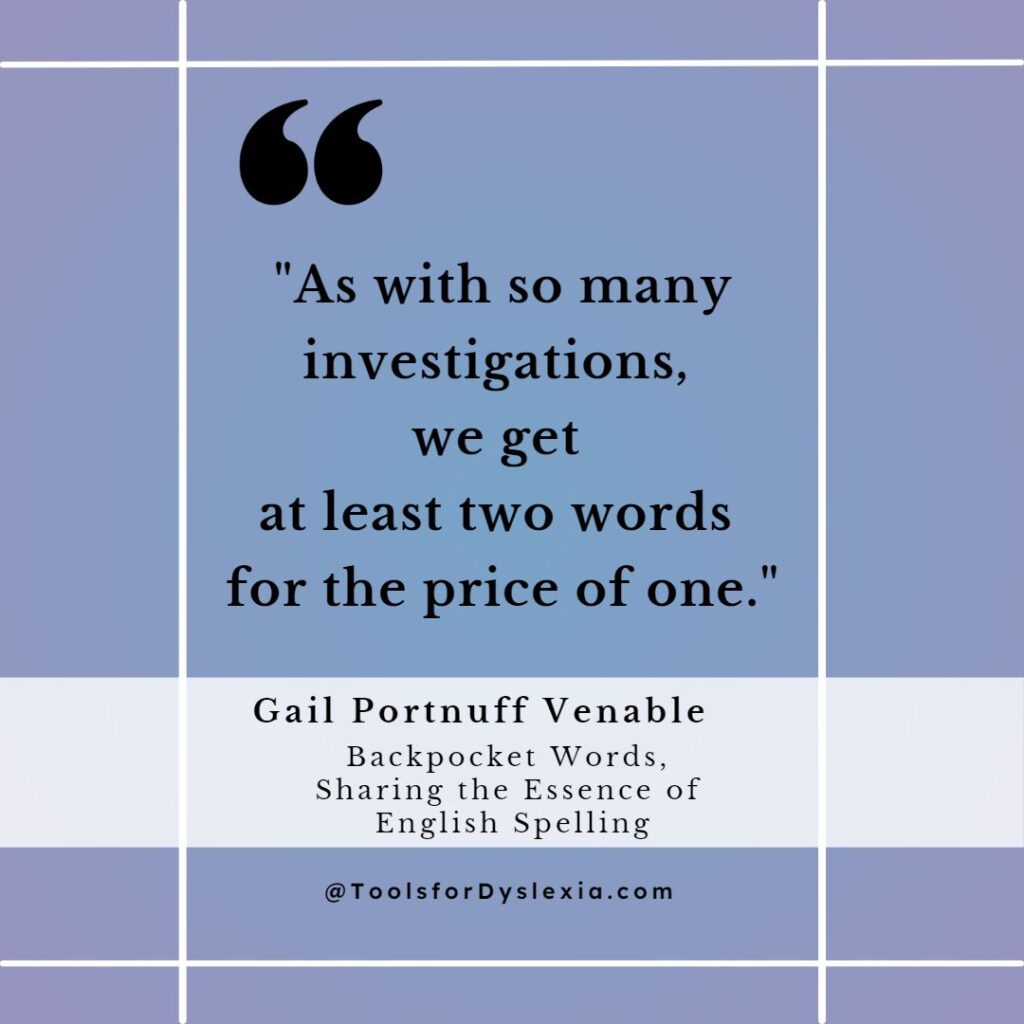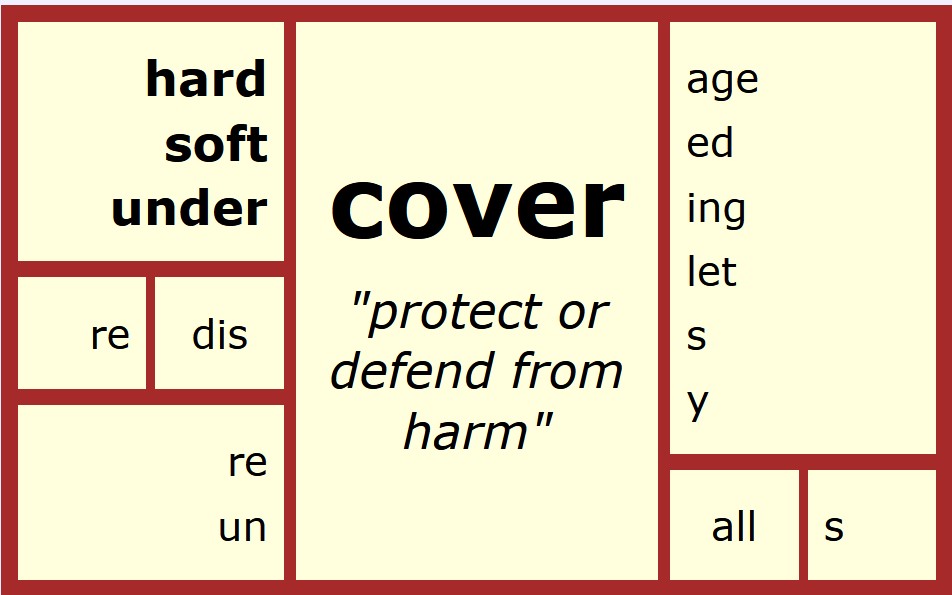A Handy Treasure Trove of Spelling
(This post contains affiliate links. Read my full disclosure.)
A couple of years ago I began working with a high school student diagnosed with dyslexia whose reading was already at grade level but needed work on spelling. Since she was doing a lot of writing for school, nearly every session began with one or more misspelling questions. Some days when she didn’t have a question I pulled a word from Backpocket Words-Sharing the Essence of English Spelling by Gail Portnuff Venable.

Over the two years, we covered a lot of spelling ground together. She loved discovering the why of spelling and learning how to find answers on her own, using tools like Etymonline.com and Word Searcher.
dis + cover + ing –> discovering
Word Sums and a matrix like the one below helped her see the structure of words. I believe these tools help students remember spelling more effectively than anything else I’ve used. Etymology, the origin and history of words, often gave us the “Because” to her “Why” questions. Knowing the why changes their mindset from “just memorize it,” to “this makes sense”.
A Spelling Treasure Trove
And that’s not just the students. There’s a growing community of parents, teachers, and tutors who have changed their minds about the craziness of our spelling system. Now, we are excited to learn about spelling.
Backpocket Words is a treasure trove of spelling adventures. Gail shares surprising connections that illustrate meaning and spelling relationships. What does the book’s title mean? If something’s in your back pocket, it’s handy, accessible.
Words in Your Back Pocket
The way Gail Venable explains it, words in your back pocket are words you have at the ready to explain spelling’s link to meaning and etymology. The book has 54 brief conversation starters. These are some of the author’s experiences talking about spelling with friends, students, and even a podiatrist at a wedding. A tech support agent asked her about <ie> and <ei>. Her grandson had a question about a word he encountered while reading How to Train Your Dragon.

Maybe you’re not planning to share the wonders of spelling at your next doctor’s appointment. Regardless, you won’t be able to see spelling the same way after reading this book. You will have a better understanding of word families and how pronunciation can vary within a word family like vine and vineyard. You may start to look at continent and consonant like my student and I did. And that may lead you to entertain, content (as in “the book’s content”), maintenance, and even other extensive detours with Latin roots and English bases.
Through Gail’s amusing and thought-provoking anecdotes, you’ll realize that 1) English spelling makes sense and 2) English spelling has amazing spelling and meaning correlations.
If you’re new to this type of word study, Gail recommends starting with “Chance Encounters” and a final section titled, “Word Investigations Up Close.”
Collateral & Ladder
One day my student asked why collateral isn’t spelled like ladder. I remembered a word study mentioned in Backpocket Words. As we talked about the spelling of collateral, we checked collate, chocolate, and ladder. We wanted to uncover any connections in meaning or etymology.
She realized that spelling collateral like ladder might work phonetically but we’d lose the meaning. With the section from Backpocket Words titled “Percolate & Collate,” we made note again how important etymology is to understanding spelling. We also took a look at relate and translate, other words with a similar spelling.

Once you start seeing these connections, the opportunity to recognize new ones is irresistible!
Each section ends with Concepts and Reflections bullet points. There’s also an index of these nuggets in the back of the book. It’s a ready resource for word studies on specific concepts you want to learn about or share.
Word Study Puzzles
A list of Backpocket Puzzles provides 26 pairs of words for you to investigate. Your task is to determine if the pair of words share a root (their etymological ancestor) and/or if the pair share a common base element. These are another way to recognize how spelling works. And be warned, you’ll likely be tempted to share these with others. They’re too good not to share!
Thanks Gail Venable for sharing your backpocket words and their stories!
What did you discover?


